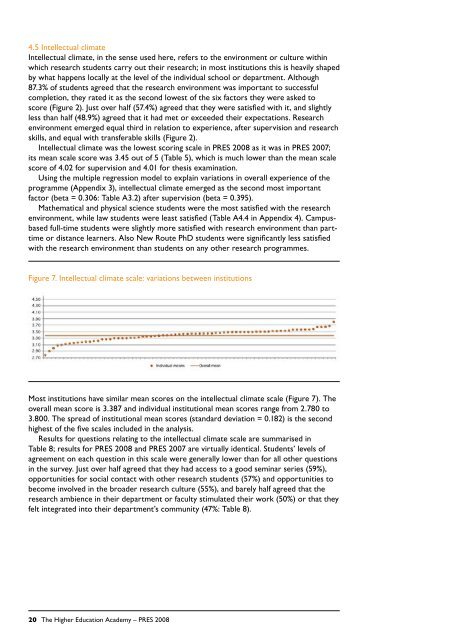Postgraduate Research Experience Survey 2008 Final report
Postgraduate Research Experience Survey 2008 Final report
Postgraduate Research Experience Survey 2008 Final report
Create successful ePaper yourself
Turn your PDF publications into a flip-book with our unique Google optimized e-Paper software.
4.5 Intellectual climate<br />
Intellectual climate, in the sense used here, refers to the environment or culture within<br />
which research students carry out their research; in most institutions this is heavily shaped<br />
by what happens locally at the level of the individual school or department. Although<br />
87.3% of students agreed that the research environment was important to successful<br />
completion, they rated it as the second lowest of the six factors they were asked to<br />
score (Figure 2). Just over half (57.4%) agreed that they were satisfied with it, and slightly<br />
less than half (48.9%) agreed that it had met or exceeded their expectations. <strong>Research</strong><br />
environment emerged equal third in relation to experience, after supervision and research<br />
skills, and equal with transferable skills (Figure 2).<br />
Intellectual climate was the lowest scoring scale in PRES <strong>2008</strong> as it was in PRES 2007;<br />
its mean scale score was 3.45 out of 5 (Table 5), which is much lower than the mean scale<br />
score of 4.02 for supervision and 4.01 for thesis examination.<br />
Using the multiple regression model to explain variations in overall experience of the<br />
programme (Appendix 3), intellectual climate emerged as the second most important<br />
factor (beta = 0.306: Table A3.2) after supervision (beta = 0.395).<br />
Mathematical and physical science students were the most satisfied with the research<br />
environment, while law students were least satisfied (Table A4.4 in Appendix 4). Campusbased<br />
full-time students were slightly more satisfied with research environment than parttime<br />
or distance learners. Also New Route PhD students were significantly less satisfied<br />
with the research environment than students on any other research programmes.<br />
Figure 7. Intellectual climate scale: variations between institutions<br />
Most institutions have similar mean scores on the intellectual climate scale (Figure 7). The<br />
overall mean score is 3.387 and individual institutional mean scores range from 2.780 to<br />
3.800. The spread of institutional mean scores (standard deviation = 0.182) is the second<br />
highest of the five scales included in the analysis.<br />
Results for questions relating to the intellectual climate scale are summarised in<br />
Table 8; results for PRES <strong>2008</strong> and PRES 2007 are virtually identical. Students’ levels of<br />
agreement on each question in this scale were generally lower than for all other questions<br />
in the survey. Just over half agreed that they had access to a good seminar series (59%),<br />
opportunities for social contact with other research students (57%) and opportunities to<br />
become involved in the broader research culture (55%), and barely half agreed that the<br />
research ambience in their department or faculty stimulated their work (50%) or that they<br />
felt integrated into their department’s community (47%: Table 8).<br />
20 The Higher Education Academy – PRES <strong>2008</strong>

















